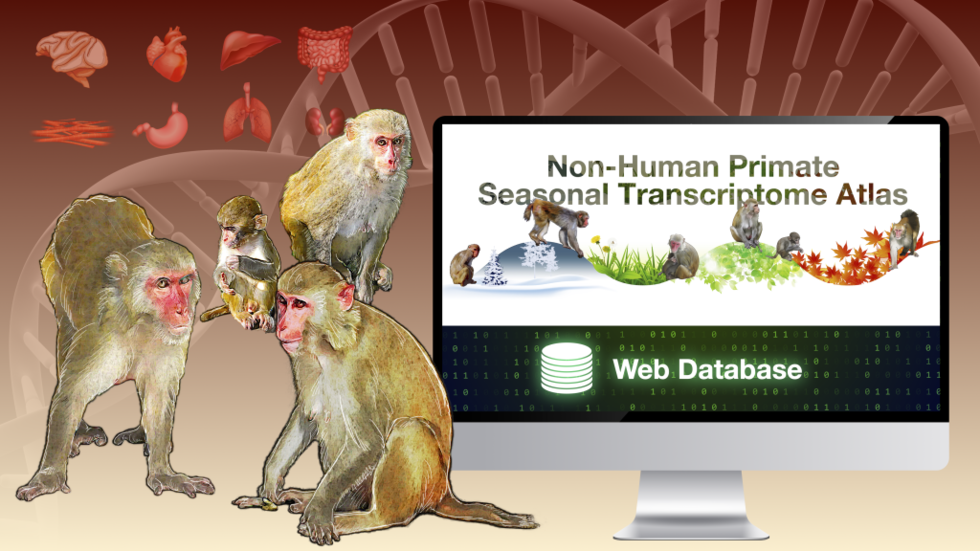
Biology
April 30, 2025
Seasonal changes affect alcohol tolerance and your waistline
Nagoya University researchers in Japan have found that drug effectiveness, alcohol tolerance, and carbohydrate metabolism change with the seasons. Their findings are based on a comprehensive seasonal gene expression map, which investigated over 54,000 genes in 80 tissues in monkeys across one year. The study has implications for drug prescription and precision medicine.
To cope with dynamic seasonal changes in the environment, animals, including humans, have evolved a biological clock that is calibrated to the seasons. Physiology and behavior, including hormone secretion, metabolism, sleep, immune function, and reproduction, change depending on the season.
To understand the nature of these changes, a research group led by Professor Takashi Yoshimura of Nagoya University’s Institute of Transformative Bio-Molecules (ITbM) turned to rhesus monkeys, a primate closely related to humans. Their analysis, reported in Nature Communications, identified multiple “seasonally variable genes” from a comprehensive gene expression map of more than 54,000 genes expressed in 80 tissues.
The study identified seasonal fluctuations in genes responsible for drug metabolism, particularly CYP2D6 and CYP2C19, which affect a quarter of common medications. Several widely used pharmaceuticals may be affected by these seasonal variations, including treatments for cancer, diabetes, high cholesterol, psychiatric conditions, hormonal therapies, and immunosuppressants used in organ transplantation.
Alcohol tolerance depends on season
To test for changes in alcohol tolerance, the team reared mice under winter and summer conditions. They found that mice reared under winter conditions recovered from alcohol intoxication more quickly.
“This result suggests that the body is more likely to become intoxicated in the summer,” Yoshimura said. “This was an interesting discovery as this may explain why the number of patients hospitalized for acute alcohol intoxication is higher in the summer in most countries.”
Women and men may differ in diet
The group found an unexpected sex difference in seasonal variation genes. Although the monkeys were fed the same diet throughout the year, the activity of genes involved in the metabolism of carbohydrates peaked during winter and spring in the duodenum of the female monkeys.
Increased carbohydrate metabolism in the duodenum is important for the body to extract the maximum amount of energy from scarce food in the winter months, which may explain why people often gain weight during this period. Then, as food becomes more available in spring, carbohydrate metabolism is enhanced to extract energy from a more diverse diet.
Chronotherapy may revolutionize our responses to these conditions
Understanding how our genes affect our response to pharmaceuticals, weight gain and alcohol intoxication may help patients.
“Our findings suggest that we should consider the time of year when administering certain medications,” Yoshimura said. “We expect that our research will contribute to chronotherapy and the future of precision medicine.”
The study, “Non-human primate seasonal transcriptome atlas reveals seasonal changes in physiology and diseases,” was published in the journal Nature Communications on April 28, 2025, at DOI: 10.1038/s41467-025-57994-1.
Authors:
Junfeng Chen, Kousuke Okimura, Liang Ren, Yusuke Nakane, Tomoya Nakayama, Yang Chen, Kai Fukawa, Soutarou Sugiyama, Takayoshi Natsume, Naoko Suda-Hashimoto, Mayumi Morimoto, Takako Miyabe-Nishiwaki, Takao Oishi, Yuma Katada, Manhui Zhang, Kohei Kobayashi, Shoko Matsumoto, Taiki Yamaguchi, Ying-Jey Guh, Issey Takahashi, Taeko Nishiwaki-Ohkawa, Daiki X. Sato, Yoshiharu Murata, Kenta Sumiyama, Atsushi J. Nagano, Hiroo Imai & Takashi Yoshimura
Media Contact:
Matthew Coslett
International Communications Office, Nagoya University
Email: icomm_research@t.mail.nagoya-u.ac.jp
Top image: Seasonal changes in alcohol tolerance revealed by monkey seasonal transcriptome atlas
(Credit: Issey Takahashi)